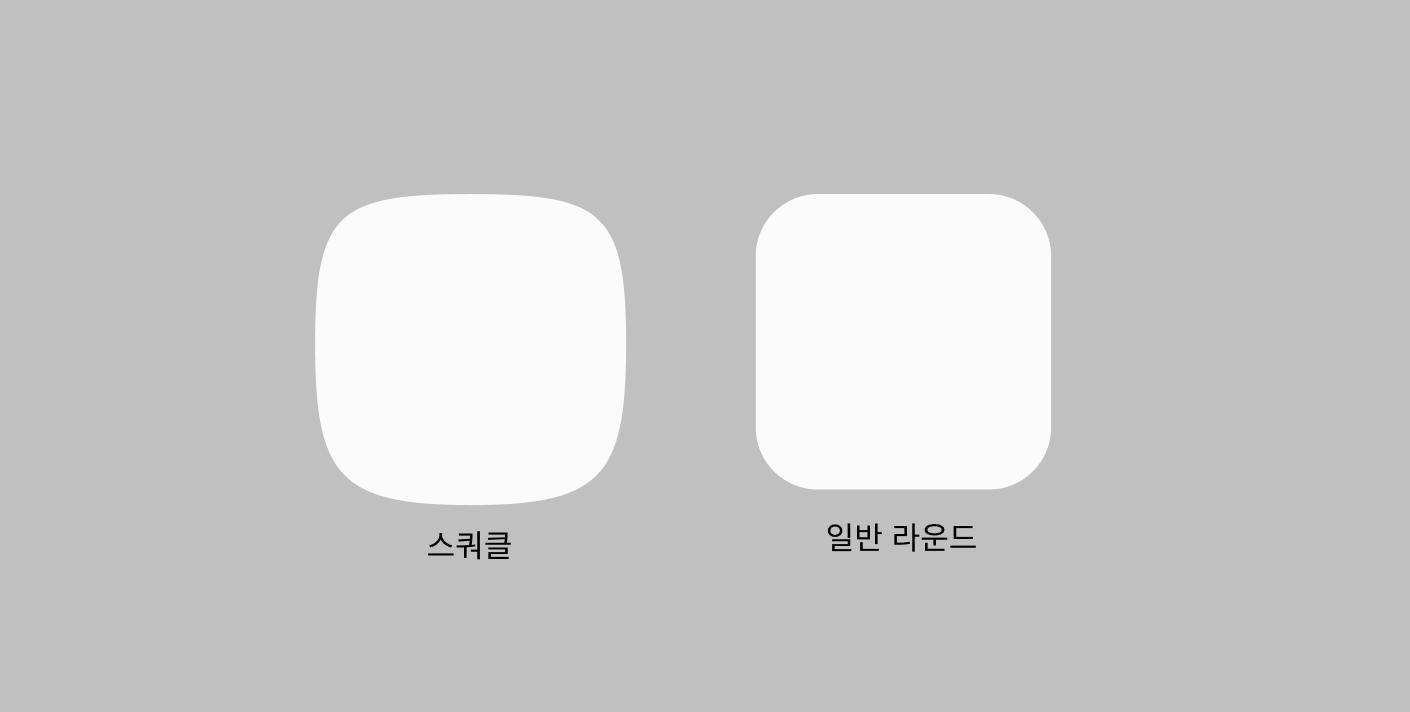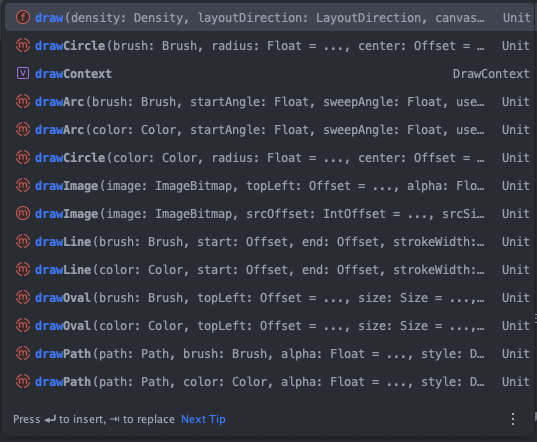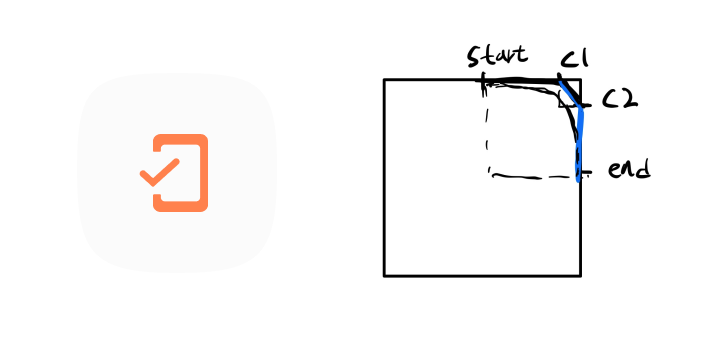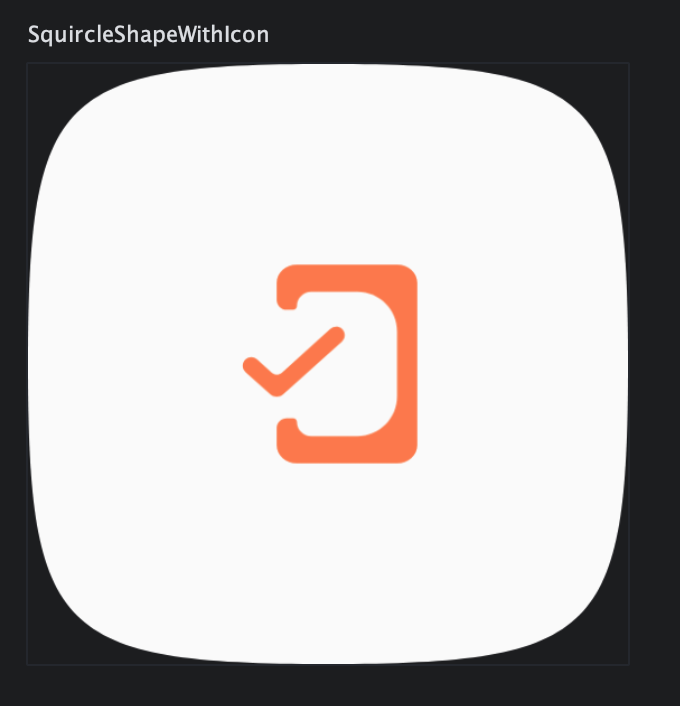Table of Contents
사이드 프로젝트 중 스쿼클 모양을 디자인에 구현해야 하는 상황이 생겨, Compose의 Custom View를 활용하여 해당 화면을 구현하며 학습한 내용을 정리하고자 합니다.
스쿼클?

스쿼클은 정사각형과 원의 중간 형태로, 정사각형과 원의 합성어이다. 위의 이미지에서 볼 수 있듯이, 일반적인 라운드 처리된 사각형과 비교하면 더 부드러운 곡률로 연결된 것을 알 수 있다.
Compose에서는 Canvas 스코프 내에서 draw라는 접두사가 붙은 함수를 활용해 커스텀 UI를 그릴 수 있다.

일반적인 선으로 이루어진 Chart 화면, 그래프와 같은 경우는 Path() 와 drawPath() 를 사용하여 그리면 될 것이다. 하지만 스쿼클의 경우 곡선 처리가 되어 있어 쉽지 않을 것이다.
Bezier Curve
Bezier Curve는 부드러운 곡선을 만드는데 이용되고 있으며, CAD, 컴퓨터 그래픽등 컴퓨터 환경에서 널리 쓰인다.
(🗣️ TMI: 학부 시절 컴퓨터 그래픽스 수업에서 Bezier Curve를 배웠던 기억이 문득났다.)
Bezier Curve는 조절점(Control point) 를 사용해 직선을 점차 기울여 곡선을 만드는 방식이다. 이 조절점은 n개가 있을 수 있으며, n개일때를 n-1차 Bezier Curve 라고 한다.
아래의 영상에서 Bezier Curve를 간략하게 설명하고 있으니 참고하면 좋습니다!
요약하자면
- 1차 Bezier Curve는 t가 0에서 1로 이동하면서 조절점 하나가 직선을 이루는 방식이다.
- 2차는 조절점 두 개를 사용해 곡선을 그리며, 조절점이 많아질수록 더욱 복잡한 곡선을 그릴 수 있다.
Compose에서는 Bezier Curve를 그리기 위한 여러 함수를 제공하며, quadraticBezierTo()는 2차, cubicTo()는 3차 Bezier Curve를 그릴 수 있다.
fun quadraticBezierTo(x1: Float, y1: Float, x2: Float, y2: Float)
/**
* Adds a quadratic bezier segment that curves from the current
* point to the point at the offset ([dx2], [dy2]) from the current point,
* using the control point at the offset ([dx1], [dy1]) from the current
* point.
*/
fun relativeQuadraticBezierTo(dx1: Float, dy1: Float, dx2: Float, dy2: Float)
/**
* Adds a cubic bezier segment that curves from the current point
* to the given point ([x3], [y3]), using the control points ([x1], [y1]) and
* ([x2], [y2]).
*/
fun cubicTo(x1: Float, y1: Float, x2: Float, y2: Float, x3: Float, y3: Float)
/**
* Adds a cubic bezier segment that curves from the current point
* to the point at the offset ([dx3], [dy3]) from the current point, using
* the control points at the offsets ([dx1], [dy1]) and ([dx2], [dy2]) from the
* current point.
*/
fun relativeCubicTo(dx1: Float, dy1: Float, dx2: Float, dy2: Float, dx3: Float, dy3: Float)
cubicTo()함수는 3개의 정점을 받게 되는데 이는 3차 베지어 곡선으로 앞의 점 3개를 이용하여 2차 베지어 곡선을 그리고, 나머지 3개의 점으로 다시 2차 베지어 곡선을 그린 것을 선형 보간하는 방식으로 그려진다.
스쿼클 그리기
스쿼클을 웹사이트에서 미리 시물레이션 해볼 수 있는 사이트가 있어 혹시 그리게 될 디자인이 있다면 조절점들을 이동하며 확인해 보고 구현할 수 있다.

스쿼클을 그리기 위해 조절점들을 start, c1, c2, end로 잡아 (start ~ c2), (c1 ~ end) 를 이용해서 그리도록 구상했다. 이 과정을 반복하여 전체 도형을 완성하도록 하자.
Preview
@Composable
fun SquircleShapeWithIcon(
modifier: Modifier = Modifier.size(200.dp),
backgroundColor: Color = Color(0xFFFBFBFB),
content: @Composable () -> Unit = {
Icon(
modifier = Modifier.size((200 / 3).dp),
tint = Color(0xFFFF814D),
painter = painterResource(id = R.drawable.icon_student_check),
contentDescription = null
)
},
) {
Box(
modifier = modifier,
contentAlignment = Alignment.Center
) {
Canvas(
modifier = Modifier.fillMaxSize()
) { // 원하는 크기
val width = size.width
val height = size.height
val path = Path().apply {
// 시작점 (상단 중앙)
moveTo(width / 2, 0f)
// 상단 오른쪽 코너
cubicTo(
width.times(0.95f), 0f, // 첫 번째 컨트롤 포인트
width, height.times(0.05f), // 두 번째 컨트롤 포인트
width, height / 2 // 도착점
)
// 오른쪽 아래 코너
cubicTo(
width, height.times(0.95f), // 첫 번째 컨트롤 포인트
width.times(0.95f), height, // 두 번째 컨트롤 포인트
width / 2, height // 도착점
)
// 아래쪽 왼쪽 코너
cubicTo(
width.times(0.05f), height, // 첫 번째 컨트롤 포인트
0f, height.times(0.95f), // 두 번째 컨트롤 포인트
0f, height / 2 // 도착점
)
// 왼쪽 위 코너
cubicTo(
0f, height.times(0.05f),
width.times(0.05f), 0f,
width / 2, 0f
)
close()
}
drawPath(
path = path,
color = backgroundColor
)
}
content()
}
}
위 코드는 Slot API 형식을 사용하여 Preview용 Icon을 삽입한 코드로 결과는 아래와 같다.


